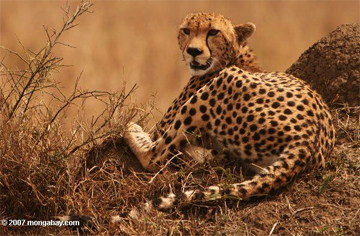|
|
The discovery of a fossilized big cat skull in northwestern China provides new evidence that cheetah originated in the Old World, rather than the Americas, report scientists writing in the journal Proceedings of the National Academy of Sciences.
The 2.2 to 2.5 million-year-old skull is far older than any cheetah remains ever discovered in the the New World. The find undermines the theory that modern cheetah (Acinonyx) shared a common ancestor with puma in the Americas some 400,000 years ago.
“A cladistic analysis confirmed that it is the most primitive cheetah known, and it shares a number of unambiguous derived cranial traits with the Acinonyx lineage, but has more primitive dentition than previously known cheetahs, demonstrating that the many unusual skull and dental characters
hitherto considered characteristic of cheetahs evolved in a gradual fashion. Isolated teeth of primitive cheetahs may not be recognizable as such, but can be confused with, for instance, those of leopards or other similar-sized pantherine cats or pumas,” wrote Per Christiansen of the Zoological Museum in Copenhagen and Ji H. Mazák of the Shanghai Science and Technology Museum, suggesting that previous researchers may have misclassified primitive cheetah fossils as belonging to other cats. “The age and morphology of the new specimen supports an Old World origin of the cheetah lineage, not a New World one, as has been suggested.”
 Cheetah in Kenya |
The cheetah is the world’s fasted land mammal, capable of achieving speeds up to 70 miles (113 km) per hour when chasing down prey. The species is today primarily found in Africa, although the a sub-species known as the Asiatic cheetah still exists in very limited numbers in Iran. The range and population of cheetah have been greatly reduced by habitat loss and direct killing by livestock herders, farmers, and hunters.
Per Christiansen and Ji H. Mazák. A primitive Late Pliocene cheetah and evolution of the cheetah lineage. Proceedings of the National Academy of Sciences (PNAS) Early Online Edition for the week of December 29, 2008